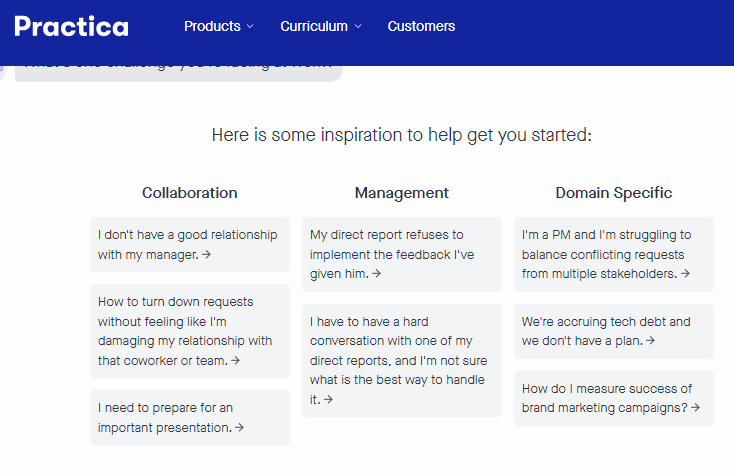The progressive startup Practica believes that artificial intelligence (AI) can mentor an individual, which prompted the development of a unique chatbot.
Established as a marketplace for executive coaching, Practica now offers AI mentoring. This AI-powered chatbot aims to redefine workplace mentorship by offering individualized advice on a range of topics, such as management, strategy, sales, personal development, growth, customer success, marketing, data, design, finance, and more.
The Practica chatbot was created based on substantial knowledge acquired through interactions with human coaches.
Practica was founded in January 2020 to address the demand for ongoing professional development via conventional executive coaching. Dave Whittemore, the former Head of Product at Thinkful (which subsequently merged with Chegg), and Andy Scheff, the former engineering manager at Dropbox, were the founders of the company.
The marketplace for executive coaches with domain-specific knowledge was one of the platform's additional expansions. Currently, 90% of Practica's revenue comes from business-to-business (B2B) transactions.

Affordable and Accessible Career Coaching
According to a TechCrunch report, Practica has identified that price proved to be a major obstacle for many potential mentoring service customers since coaching services cost an average of $200 per hour and around $3,000 annually. This difficulty led the organization to explore the possibility of AI-powered coaching.
Practica combined AI technology with years of effective one-on-one coaching experiences. They utilized several free instructional materials, including books, podcasts, videos, blogs, and conferences. These well-selected resources developed hundreds of skills in many topics.
Practica utilizes the Retrieval Augmented Generation (RAG) approach to provide professional users with excellent guidance by matching the most appropriate learning materials to their requirements. Like a human coach, the AI coach encourages users to fully interact with the information by explaining the retrieved content sources and their significance.
The method that Practica employs combines a variety of coaching tools, including instructional strategies, context-based inquiry, and matching learning objectives with particular professional aspirations. To enable smooth communication, the AI arranges learning material insights into a list that is easy to navigate and includes reference notes. This AI can recall users' histories, helping them gain skills, unlike conventional chatbots.
Read Also : Bill Gates' Ex-Assistant Steve Ballmer's Net Worth Skyrockets, Closing Gap with Microsoft Co-Founder
Embracing AI To Cope in a Changing Landscape
AI has the potential to revolutionize several sectors, but it also raises concerns about how jobs may be affected. AI solutions like ChatGPT have the potential to help professionals in creative fields like graphic design and art generate better work. Democratization and increasing competition may cut salaries in certain areas, prompting several worries, according to Insider.
The business industry's obsession with developing autonomous machine intelligence and artificial general intelligence has taken the focus away from worker demands.
The goal of many firms is to automate as many tasks as they can, although this is often ineffective. An article from the Stanford Social Innovation Review suggests that labor must align with technology to address the issue.
Moreover, opposition to AI is not viable. Instead, labor should embrace AI, envisioning how it can enhance both workers and corporations by boosting productivity in decision-making and problem-solving tasks.

ⓒ 2025 TECHTIMES.com All rights reserved. Do not reproduce without permission.




